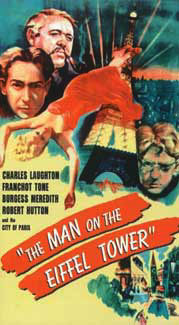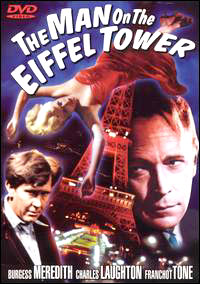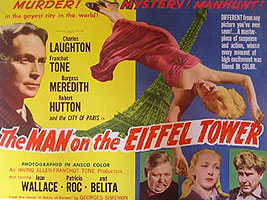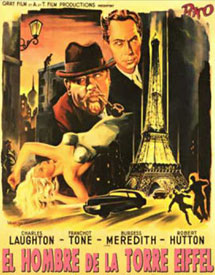 From a Georges Simenon mystery novel, character actor Burgess Meredith took over the director's chair for The Man on the Eifel Tower (1949), after co-star Charles Laughton refused to work with the original director.
From a Georges Simenon mystery novel, character actor Burgess Meredith took over the director's chair for The Man on the Eifel Tower (1949), after co-star Charles Laughton refused to work with the original director.
Laughton bore an unreasoning grudge against the whole production & later bought up all prints to suppress it. For decades it remained unavailable for viewing.
Lazy wastrel & dandy Bill Kirby (Robert Hutton) lives on credit waiting for his wealthy aunt to die. One day failed medical student Johann Radik (Franchot Tone) slips him a note offering helpful services from one desparate man to another. Murder is obviously what is meant.
 Meredith besides directing also plays the knife-sharpener Joseph Heurtin, who plies his trade on the street of Paris with his portable grinding stone. Meredith besides directing also plays the knife-sharpener Joseph Heurtin, who plies his trade on the street of Paris with his portable grinding stone.
The pathetic knife grinder from his own desparation attempted an ill-considered burglary, only to be horrified to discover corpses of the dead matron & her maid a suspect, & loses his glasses for quick discovery by the police. Nearly blind & in a panic, a seeming samaritan helps him get home, but the samaritan is the actual killer.
Charles Laughton plays Inspector Jules Maigret, who lets Kirby escape custody, hoping to be led to the hired killer. Laughton's a fine screen presence who makes as much as can be made of the character, tough too reliant on scene-stealing tricks like playing with his pipe & screwing up his face absurdly.
The killer is a manic depressive who might've been a great doctor, but that mental illness sabotaged his life. Having settled for being a sinister genius, he'll be hard for Maigret to bring to ground.
Poor Joseph wanders Paris evading police & hoping to be spotted by the one man who has promised to help him, the man who is the actual killer, Radek. In a manic mood & totally certain of himself, Radek gaily invites Maigret to lunch in the Eiffel Tower restaurant.
 But having failed to convince Maigret that the knife grinder is the guilty party, he sets out to manipulate evidence, still sure he can get Joseph arrested instead of himself. But having failed to convince Maigret that the knife grinder is the guilty party, he sets out to manipulate evidence, still sure he can get Joseph arrested instead of himself.
He gets way too clever toward the end & essentially digs his own grave. Fleeing in terror to the Eiffel Tower for an ending reminiscent of Hitchcock for visual impact, the ending doesn't actually make sense, unlike with Hitchock who manages to come up with a good excuse for the visuals.
Although it has its moments, the film feels interminable. We have a film noir mood with shadowy sets, but that mood is undermined by having been filmed in color. The color has gone muddy from poor preservation, but this probably helps the film a bit, restoring a bit of the moodiness it loses by not being black & white.
The plot with subplots is too busy with muddled editing. Though slightly confusing, it's not an especially clever story, so what effectiveness it drums up relies on how good or bad Tone, Meredith, & Laughton can manage to be.
Meredith alas is little more than the fellow he played in a famous Twilight Zone episode, "Time Enough at Last," Henry Bemis having likewise been half blind & pitiful but more cypher for the story's gag, not a fully developed character. Laughton is much more interesting showing Maigret using profiler techniques seemingly very modern. And Tone creates an entertaining portrait of the psycho for hire.
copyright © by Paghat the Ratgirl
|

